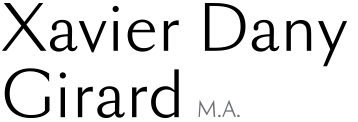PhénoménArt¹ Trainings
Between oil pastel and tactile paint, which of these mediums do you think is more inclined to contain emotions? Which of those dimensions between shapes, movement, space and colour are part of art material? Finally, did you know that art is: “…the creation of symbolic forms of the human emotions?”²
“Knowing how to draw is not a required prerequisite, neither a selection criteria to subscribe to trainings”
Right or left hemisphere?
Which part of your brain is analogical and capable of seeing the big picture of a situation right from the start? Which hemisphere do you use to keep track of time? Using the symbol (+) to calculate a sum comes from which brain mode?
Note : For a custom training adapted to your needs, please contact me by phone or e-mail.
Professional Trainings
1. ART THERAPY:
Additional tool for clinical intervention
Duration: 1 day
Theoretical content: Art-therapy utilities. Creative process phases. Mediums axis. Clinical case… etc.
Experiential aspect: Collective mural. 2D composition workshop. analog drawing. 3D composition workshop.
2. THERAPIST–CLIENT INTERACTIONS:
Introduction to art therapy counselling approaches
Duration: 1 day
Theoretical content: Scribbles: definition and utilities, assisting the client with the workshop preparation steps. Phenomenological method. Clinical case… etc.
Experiential aspect: Individual scribbles exercises. Interactive duo communication workshops. Phenomenological pre-game… etc.
Corporate Training Programs
1. GROUP DYNAMICS:
Exploration through various art mediums
Duration: ½ day
Theoretical content: Emotional needs. Personal development stages. 3 steps interpersonal relationships… etc.
Experiential aspect: Multi-sensory learning experiences vs. educational training. Individual or collective creation workshop options.
2. PROBLEM-SOLVING:
Exploration through various art mediums
Duration: ½ day
Theoretical content: Analog drawing workshop. Exploration of the creative steps. Visual conceptualization of problems-solving.
Experiential aspect: The content/container exercise. Analog drawing: illustrating an idea, a problem to solve… etc.
*See also the Art Ému workshops section.
